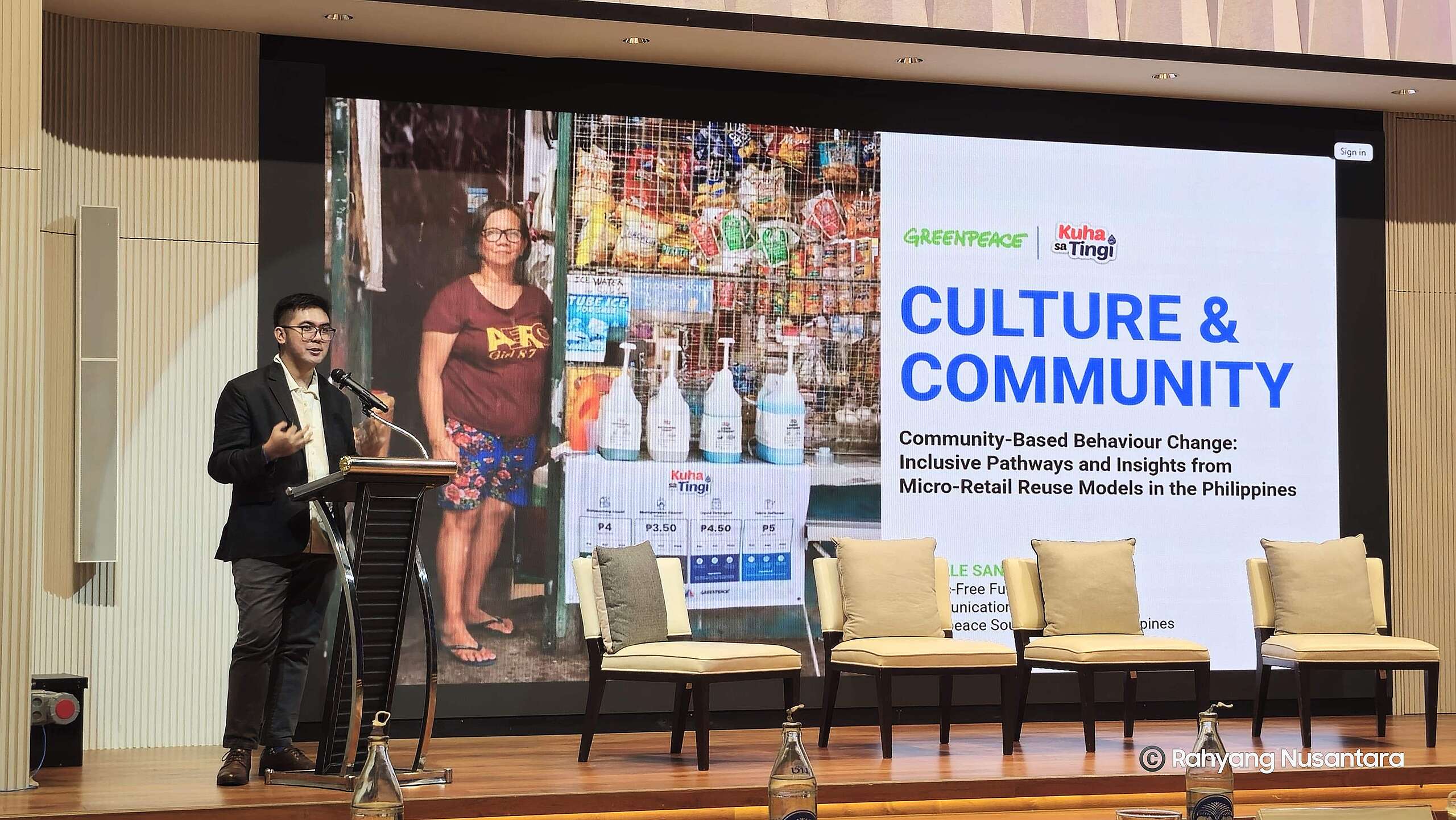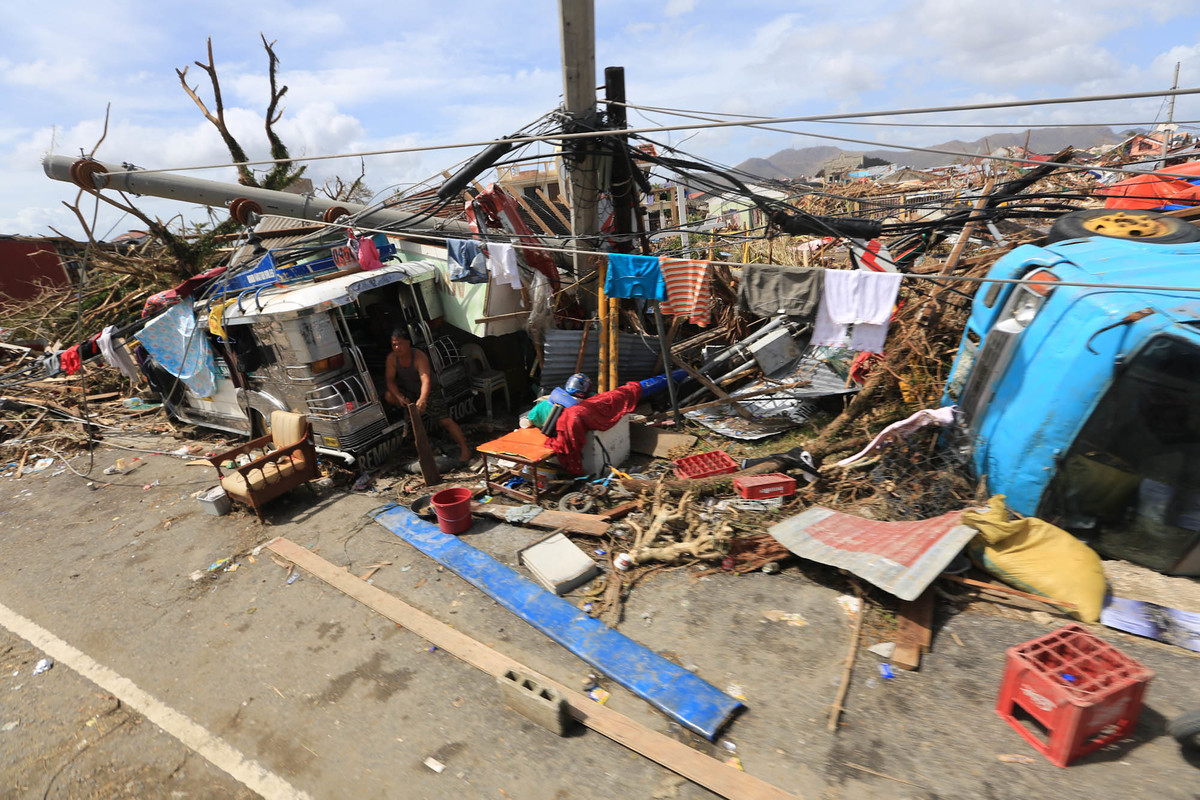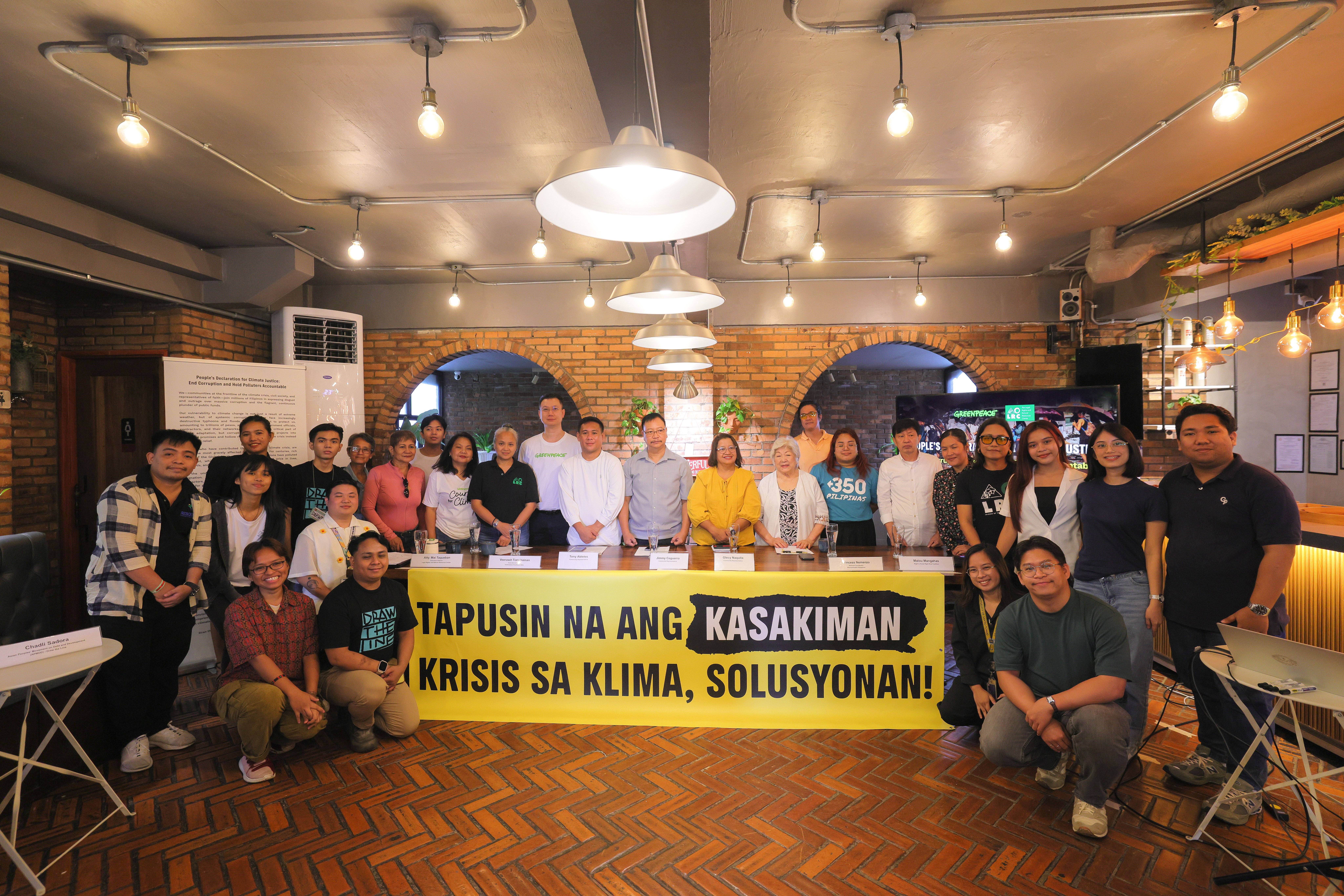Coastal communities show how plastic sachet makers are harming Filipinos
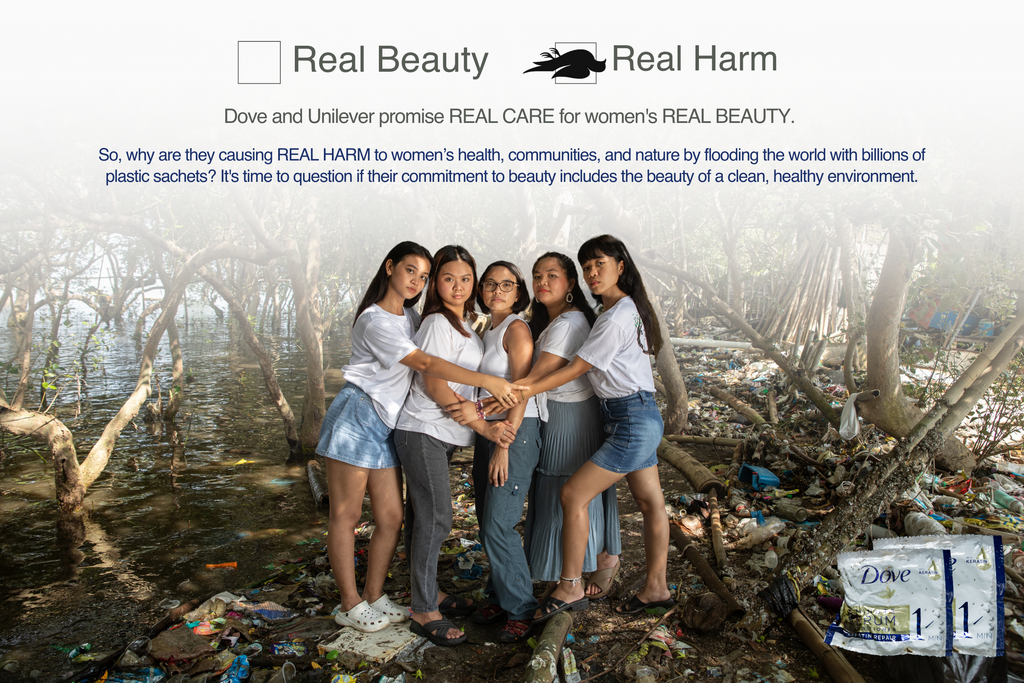
QUEZON CITY, Philippines (17 July 2024) — Residents of a coastal community in Bataan Province are using brand parodies to show how plastic sachet manufacturers are bringing “real harm” to Filipinos. Playing with popular advertisements, the groups illustrated how plastic sachets and other single-use plastics are not only destroying nature, but also harming human health and livelihoods.
The creative protest1, held in time for Plastic-Free July, is a collaboration by the Young Bataeños for Environmental Advocacy Network (YBEAN), Pagkakaisa ng mga Samahan ng Mangingisda – Bataan (PANGISDA-Bataan), and Greenpeace Philippines. The ads they parodied are meant to expose the impacts of relentless plastic production by brands and corporations that have consistently placed in Break Free From Plastic’s annual Brand Audits globally and locally2. These include Unilever, Nestle, and P&G3, among others, which have been the subjects of a consumer complaint filed at the Department of Trade and Industry. The groups are calling for companies to stop producing sachets, and for the government to regulate single use plastics (SUPs), starting with instituting a national ban.

“Corporations producing sachets and single-use plastics are creating severe problems for our community, affecting our daily lives, health, and livelihood. Despite our efforts to combat plastic pollution, plastics continue to accumulate in our oceans and communities, raising concerns about food and health security,” said Eric Beren, YBEAN Secretary General. “Fisherfolk often encounter plastics that damage their equipment. If corporations and our government don’t address this crisis, we fear the situation will worsen for future generations.”
In the Philippines, where companies aggressively market sachets, the absence of meaningful policies to curb sachet production has led to an estimated 164 millions sachets consumed daily, on top of the long list of other single-use plastics produced by corporations. These companies are aware of the difficulties in handling sachet waste and have even pledged to make their plastic packaging reusable, recycled, or compostable by 2025. However, with little to no progress on their pledges, their continued reliance on sachets continues to perpetuate pollution, posing threats to both human health and the environment. In a duplicitous move, some corporations also opt for false solutions, such as burning sachets as fuel for various industries, further exacerbating the issue.
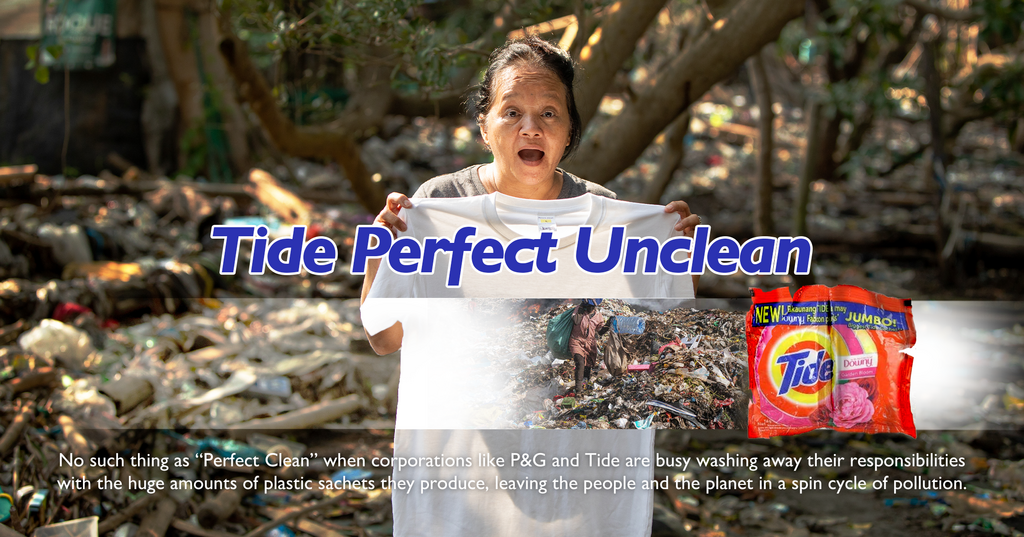
“These parodies might seem humorous, but the plastic pollution unleashed irresponsibly into the environment by companies like Unilever, Nestle, P&G and others is no laughing matter,” said Marian Ledesma, Greenpeace Zero Waste Campaigner. “Sachets are not only littering our waters and cities—we are already breathing, eating, and drinking microplastics, and they are damaging our health. Companies must own up to the pollution they cause and eliminate sachet and SUP production.”
The struggle with sachets and single-use plastics begins with fossil fuel extraction for 99% of plastics, followed by production processes that emit toxins and pose health risks. These issues continue downstream, as sachets end up in landfills, rivers, and coastal communities, harming ecosystems, wildlife, and human health. A recent survey by WR Numero shows that around 60% of Filipinos support banning single-use plastics—an indication that corporations should heed their consumers’ concerns for the well-being of Filipinos.

Given the continued prevalence of sachets in consumer goods, and the fact that the same companies are perpetuating our dependence on single-use plastic packaging, the groups believe that the Philippine government must treat this as an urgent issue and enact a national ban on sachets and other SUPs, through any of the following measures: 1) including sachets and common SUPs in the list of non-environmentally acceptable products (NEAP) under the Ecological Solid Waste Management Act (RA 9003)4; 2) improving the Extended Producer Responsibility Act so that it focuses on waste avoidance and reduction, entailing a ban on SUPs and targets for reuse, or 3) passing and implementing a law banning SUPs, including sachets, at a national level. Philippine laws must also mandate corporations to reduce their plastic production, and must create binding targets for these companies to adopt reuse and refill systems to replace single-use plastics in their operations.
“When brands talk about ‘Real Beauty’ or ‘Good Food. Good Life’ or other catchy pledges to do good, are they really walking the talk? These promises are drowned in the millions of sachets and plastics they produce,” said Ledesma. “The Philippines can only return to its natural ‘Real Beauty’ when it is free from plastic pollution. Similarly, Filipinos can only truly enjoy a ‘Good Life’ when there are no microplastics or toxic chemicals contaminating our food systems, and plastic pollution is not threatening our health and livelihoods. Corporations must phase out sachets and make reuse and refill options more accessible to Filipinos.”
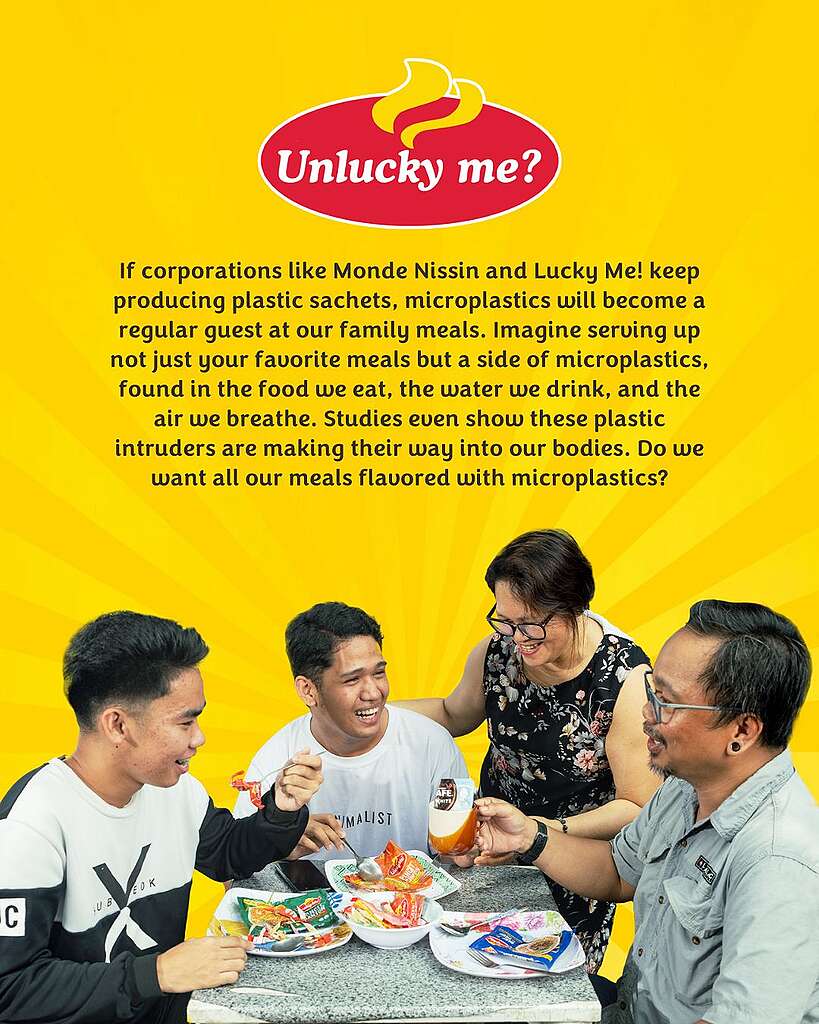
“As a young person in the community, I see plastic pollution as a worsening social issue in our country. Plastics are everywhere. Plastic pollution significantly harms our environment, communities, and livelihoods. It also threatens our future,” said Jochelle Magracia, YBEAN Chairperson. “The youth dream of a plastic-free future, so it’s crucial for our government and citizens to hold big corporations accountable for finding solutions to their plastic production.”

STOP SACHETS! Demand action from corporations and the government to protect the planet and the people from the impacts of single-use plastics.
ADD YOUR VOICE###
AD PARODIES AND PHOTOS:
You may register and download the ad parodies here.
Meanwhile, you may access the other photos of the creative protest here.
NOTES TO EDITORS:
1 The creative demonstration reveals the true extent of the plastic crisis and its devastating effects on local communities, and highlights the deception in marketing campaigns by brands that promise care and sustainability but continue to harm nature and vulnerable communities with the overproduction of single-use plastics, especially sachets, in the name of profit. A report shows that the true cost of plastic on the environment, health, and economies can be up to 10 times higher for low-income countries, which bear a disproportionately large burden of the costs associated with plastic pollution.
2 Break Free From Plastic’s global brand audit, running for six consecutive years, is a participatory community initiative in which branded plastic waste is gathered, counted, and documented by volunteers to identify the companies responsible for plastic pollution.
3 Procter & Gamble (P&G) is currently implementing the negotiated compromise with Filipino consumers which was the result of a consumer complaint filed with the Department of Trade and Industry. The company is welcoming suggestions from the consumer complainants to improve its labels and advertisements. Its products, alongside those from other brands, were included to raise awareness of the many adverse impacts of plastic sachets. The community volunteers have been looking forward to P&G making good its obligations under the compromise.
4 In a 9 July 2024 decision, the Court of Appeals (CA) directed the government, through the National Solid Waste Management Commission (NSWMC) and its member agencies, to issue a list of non-environmentally acceptable products (NEAP) within six months. This is in compliance with the Ecological Solid Waste Management Act of 2000 or Republic Act 9003, which mandates a NEAP list be issued one year after its effectivity and subsequent annual updates of the said list. The CA granted the writ of kalikasan, a legal remedy under Philippine law protecting one’s right to a balanced and healthy environment, petitioned by environmental groups and advocates before the Supreme Court (SC) in November 2021. The writ of kalikasan stops any harmful act to the environment or compels actions be taken to protect nature.
MEDIA CONTACTS:
Karl Orit, Greenpeace Communications Campaigner
[email protected] | +63 9194571064
Eunille Santos, Greenpeace Digital Campaigner
[email protected] | +63 9175411248

